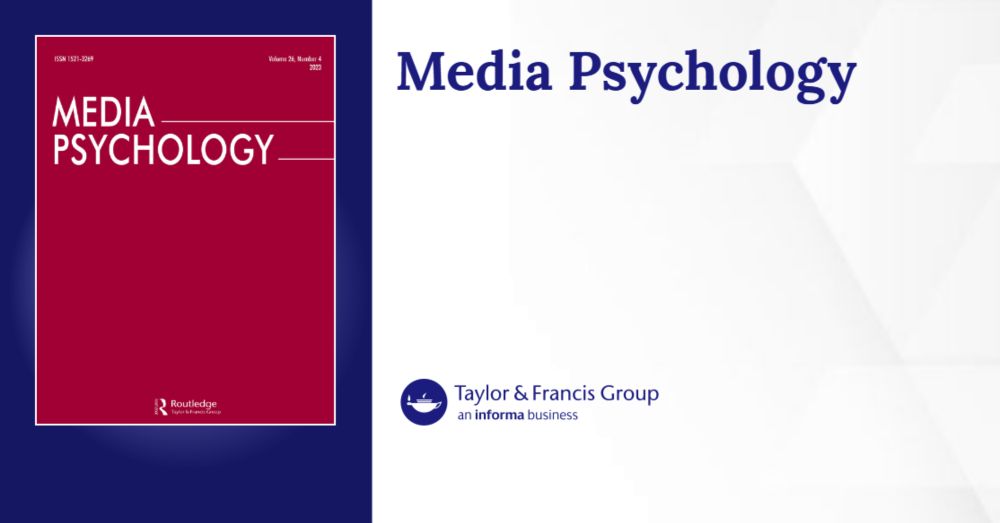OSF
Finally :) Preprint of Susanne Baumgartner and my paper Short but still valid: Validating Single-Item Measures for Key Communication Science Constructs for Experience Sampling Research.
In a 5-Study procedure, we assess the validity of in total 21 constructs osf.io/preprints/ps...
14.07.2025 08:19 — 👍 24 🔁 10 💬 4 📌 1
🚀 The GESIS AppKit is live! 🚀
Three years ago we started the project of providing "an App" for Social Scientists @gesis.org . Today, it is much more than that. It is a management system for mobile, intensive-longitudinal studies. Interested?
✅ Register here: www.gesis.org/gesis-appkit...
12.03.2025 07:28 — 👍 53 🔁 26 💬 3 📌 3
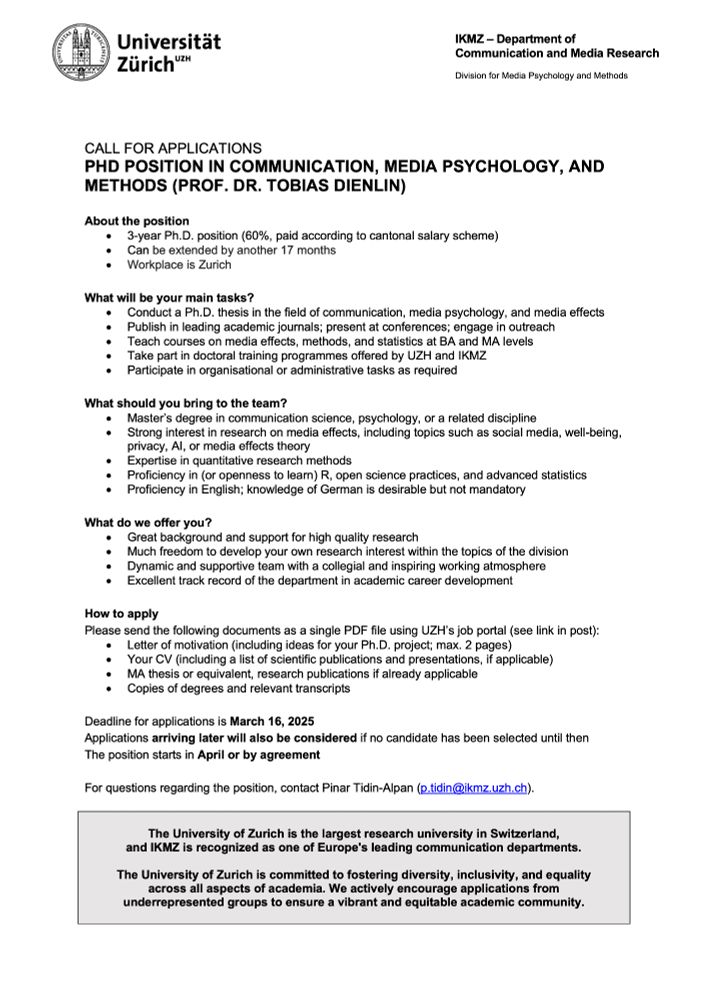
About the position
• 3-year Ph.D. position (60%, paid according to cantonal salary scheme)
• Can be extended by another 17 months
• Workplace is Zurich
What will be your main tasks?
• Conduct a Ph.D. thesis in the field of communication, media psychology, and media effects
• Publish in leading academic journals; present at conferences; engage in outreach
• Teach courses on media effects, methods, and statistics at BA and MA levels
• Take part in doctoral training programmes offered by UZH and IKMZ
• Participate in organisational or administrative tasks as required
What should you bring to the team?
• Master’s degree in communication science, psychology, or a related discipline
• Strong interest in research on media effects, including topics such as social media, well-being, privacy, AI, or media effects theory
• Expertise in quantitative research methods
• Proficiency in (or openness to learn) R, open science practices, and advanced statistics
• Proficiency in English; knowledge of German is desirable but not mandatory
What do we offer you?
• Great background and support for high quality research
• Much freedom to develop your own research interest within the topics of the division
• Dynamic and supportive team with a collegial and inspiring working atmosphere
• Excellent track record of the department in academic career development
How to apply
Please send the following documents as a single PDF file using UZH’s job portal (see link in post):
• Letter of motivation (including ideas for your Ph.D. project; max. 2 pages)
• Your CV (including a list of scientific publications and presentations, if applicable)
• MA thesis or equivalent, research publications if already applicable
• Copies of degrees and relevant transcripts
Deadline for applications is March 16, 2025
Applications arriving later will also be considered if no candidate has been selected until then
The position starts in April or by agreement
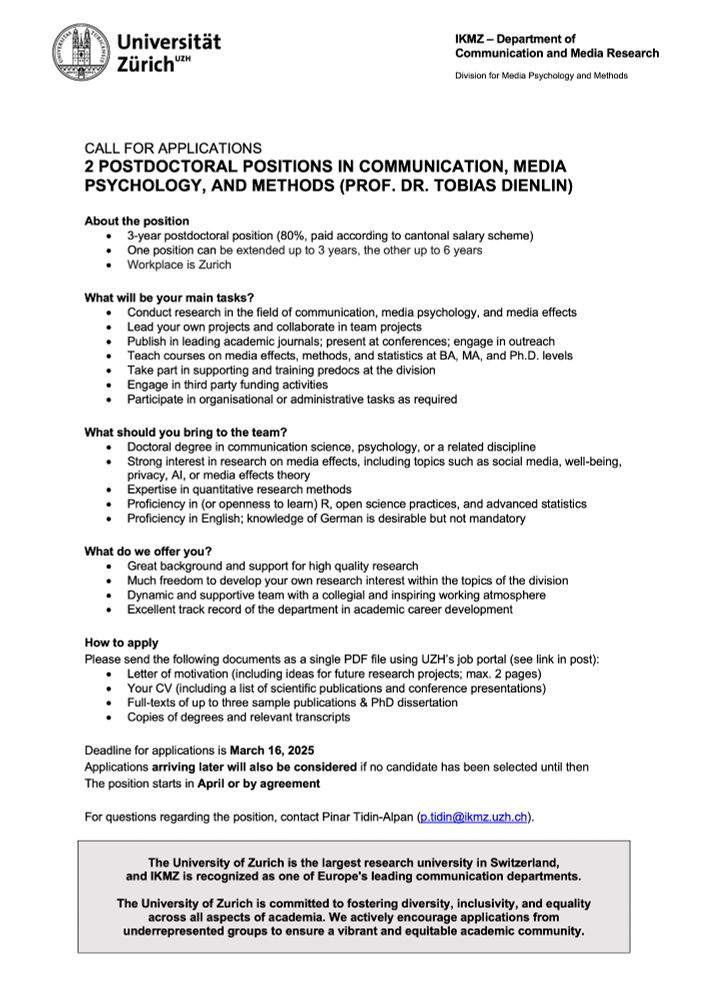
About the position
• 3-year postdoctoral position (80%, paid according to cantonal salary scheme)
• One position can be extended up to 3 years, the other up to 6 years
• Workplace is Zurich
What will be your main tasks?
• Conduct research in the field of communication, media psychology, and media effects
• Lead your own projects and collaborate in team projects
• Publish in leading academic journals; present at conferences; engage in outreach
• Teach courses on media effects, methods, and statistics at BA, MA, and Ph.D. levels
• Take part in supporting and training predocs at the division
• Engage in third party funding activities
• Participate in organisational or administrative tasks as required
What should you bring to the team?
• Doctoral degree in communication science, psychology, or a related discipline
• Strong interest in research on media effects, including topics such as social media, well-being, privacy, AI, or media effects theory
• Expertise in quantitative research methods
• Proficiency in (or openness to learn) R, open science practices, and advanced statistics
• Proficiency in English; knowledge of German is desirable but not mandatory
What do we offer you?
• Great background and support for high quality research
• Much freedom to develop your own research interest within the topics of the division
• Dynamic and supportive team with a collegial and inspiring working atmosphere
Please send the following documents as a single PDF file using UZH’s job portal (see link in post):
• Letter of motivation (including ideas for future research projects; max. 2 pages)
• Your CV (including a list of scientific publications and conference presentations)
• Full-texts of up to three sample publications & PhD dissertation
• Copies of degrees and relevant transcripts
Deadline for applications is March 16, 2025
Applications arriving later will also be considered if no candidate has been selected until then
The position starts in April or by agreement
I'm hiring! I'm looking for 1️⃣ pre-doc and 2️⃣ post-docs.
If you're fascinated by media effects, quantitative methods, and open science, please consider applying 🙂
International applications welcome!
Application Pre-doc: jobs.uzh.ch/job-vacancie...
Application Post-doc: jobs.uzh.ch/job-vacancie...
03.03.2025 17:25 — 👍 64 🔁 51 💬 0 📌 5
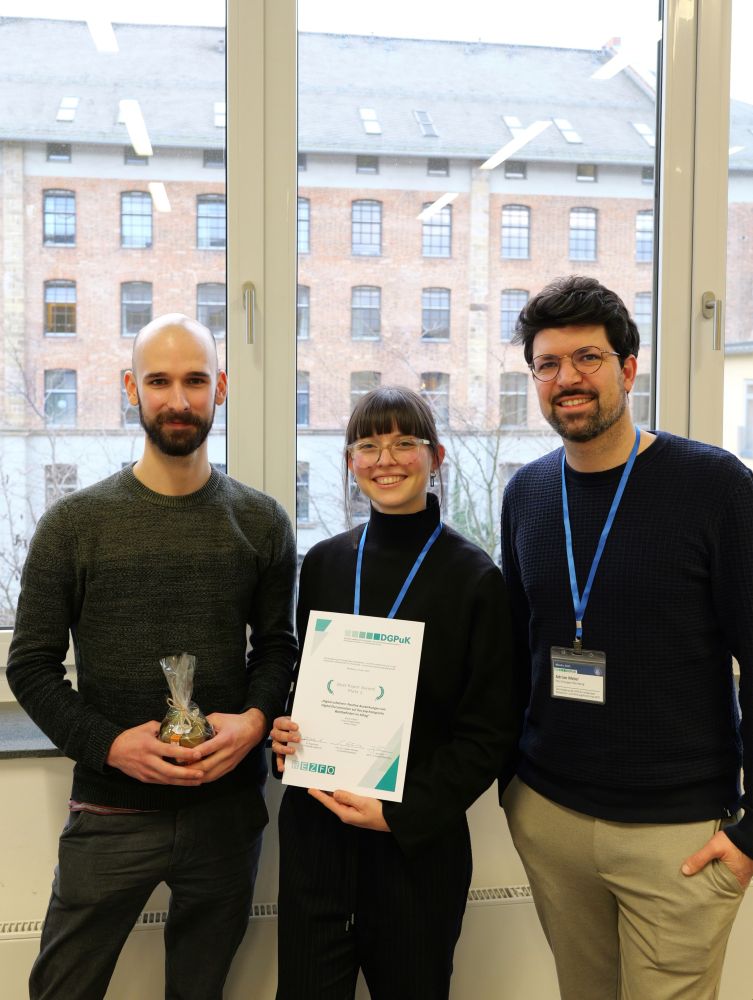
A photo of the coauthors Julius Klingelhoefer, Alicia Gilbert, and Adrian Meier with their top paper certificate.
Our disconnection project won a top paper #award at the @rezfo.bsky.social media use and effects conference last week! 🎀✨🪩 Happy times with my coauthors @klingelhoefer.bsky.social @adrianmeier.bsky.social
➡️ Find the preprint of the study at osf.io/preprints/ps...
28.01.2025 15:21 — 👍 25 🔁 6 💬 1 📌 1
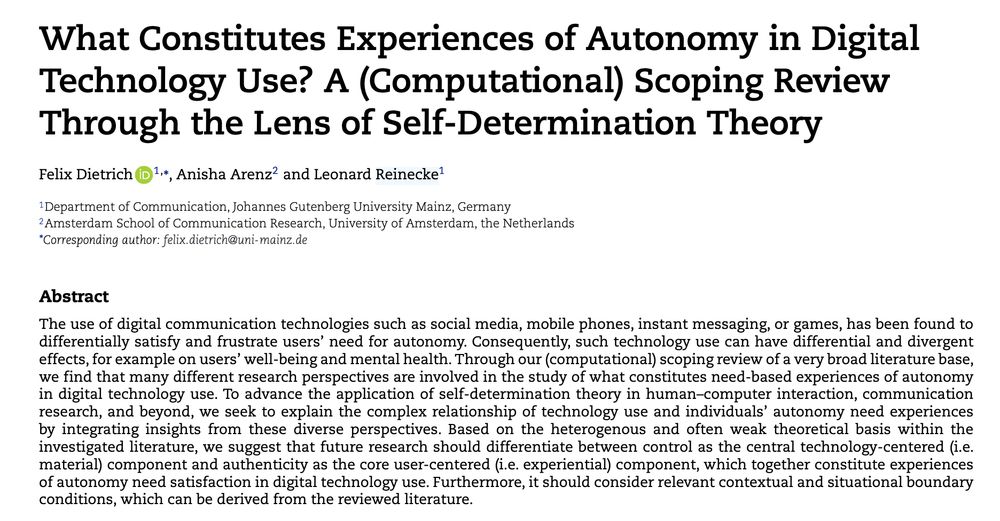
Ever wondered what researchers beyond #commsky have to say about autonomy in digital technology use (e.g., affordances, situations, context)?
Check out our interdisciplinary, large scale (computational) scoping review w/ @anishaarenz.bsky.social @leonardreinecke.bsky.social
doi.org/10.1093/iwc/...
20.01.2025 13:41 — 👍 9 🔁 5 💬 0 📌 0
Sounds great! And yes, I had a different paper accepted, so I'll be there :)
17.01.2025 08:47 — 👍 1 🔁 0 💬 0 📌 0
Thank you, Sara - would love to hear your thoughts on this!
16.01.2025 16:20 — 👍 0 🔁 0 💬 1 📌 0
OSF
What content do people watch when experiencing stressors? We matched data donations w/ content descriptions & linked them to diary surveys for an answer! Sadly rejected at #ica25 but proud of this collab w/ @felix-dietrich.de, @aliciagilbert.bsky.social, @leonardreinecke.bsky.social 👉 doi.org/n2z2
16.01.2025 13:30 — 👍 23 🔁 2 💬 1 📌 3


